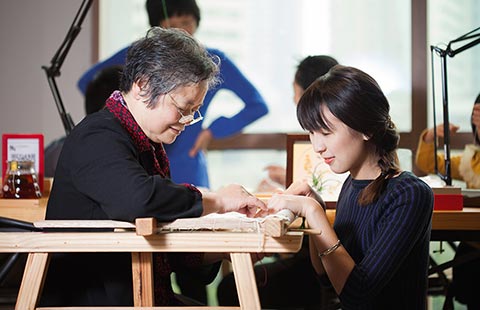Hometown banks on Nobel laureate to boost tourism
(Xinhua) Updated: 2012-10-19 14:21JINAN -- Tour guides are busy memorizing their new scripts about places where Mo Yan, the newest Nobel literature laureate used to live, write and derive inspiration from.
This is part of local tourism officials' rush to capitalize on the "Mo-mania" that has been gripping the country since the writer became China's first Nobel literature laureate last week.
Red lanterns are being raised and red sorghum will be grown to give pilgrims an original taste of Gaomi, Mo's hometown and the setting for most of his works, according to local tourism officials.
The old house, where Mo spent his childhood and where his father and brother still live is being renovated.
"Gaomi is no longer what it was," said poet Li Danping from the East China city with a population of 900,000. "It is now the holy land of the country, Mecca of Chinese literature."
Tourists are now swarming to Ping'an village, which they would never have stopped in had it not been Mo's hometown.
Some visitors are reportedly even taking radishes and yams from fields near Mo's old house as a "special souvenir".
Mo's hometown is closely related to his literature.
He lamented the disappearance of red sorghum, the crop that inspired the award-winning film "Red Sorghum" based on one of his best-known novels, in his hometown.
But business savvy officials have seen a tourism opportunity.
Local officials have confirmed that they will encourage farmers to re-grow 660 hectares of the crop to help entice tourists.
As much as 10 million yuan ($1.5 million) will be used to encourage local farmers to resume plantation of the crop. They stopped growing sorghum due to low economic yields, said Fan Hun, head of the management committee of Gaomi's Jiaohe Shugang Logistics Zone, where Mo's old house is located.
The move is a part of the committee's tourism development package.
"On Monday, we submitted a proposal that aims to fully tap the cultural resources of 'red sorghum' to develop tourism here," Fan said.
The proposal suggests building demonstration centers for Mo's works and red sorghum-related movies within the next three years with investment of 670 million yuan ($103 million).
"Big investment brings big development," Fan said.
His confidence was shared by Wang Jianzhi, head of Gaomi's tourism bureau, which has been calling for investment from entrepreneurs since Mo's nobel literature prize win.
Wang initiated an online campaign on Monday, inviting the country's netizens to vote for their favorite Gaomi places that Mo depicted in his works.
"The places that get the most votes will be chosen as possible locations for films adapted from Mo's works," Wang told media.
The official said the bureau is also designing a tourist route in Gaomi, which will have banners that read "Congratulations to Nobel laureate Mo Yan".
Media reports said that Mo once frowned upon the crazed expansion of tourism sectors in Gaomi, saying it would make the city a "laughing stock".
It is not clear whether he made the criticism before or after his Nobel literature prize win.
Most netizens on China's popular portal Sina.com website who responded to the reports said they did not think it was a good idea to transform Gaomi into a tourist destination just because it was Mo's hometown.
Some even mocked that the city's tourism development plans are even of more "hallucinatory realism" than Mo's works.
- China's stock market value rises amid improving sentiment
- Australian wine exports to China up 64%
- Lexus expects boost in petrol-electric hybrids
- Head of Qoros says it will stand on its own in 3 years
- BMW gains competitive edge with price cuts
- Smart age makes a billionaire in 6 years
- Culture growing into strong pillar of China's economy
- South China auto hub to build more charging points

















